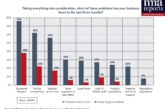
Travis Perkins plc has published its Half Year Results for the six months ended 30 June 2024.
In the Summary of its HY24 Results, Travis Perkins plc cautions that the “trading environment has remained challenging for the Group as the key trends from the second half of 2023 – ongoing macroeconomic and political uncertainty, weak end market demand and deflation on certain key commodity products – continued through the first half of 2024.
“This was reflected in the Group’s revenue and earnings performance during the period and management’s primary focus has been on driving efficiencies through the transformation of the Group’s operating model. Alongside disciplined capital allocation, this will support progressive recovery of profitability and reduction of leverage.”
H1 2024 Performance
According to the report, the Group delivered revenue of £2,362m, down (4.4)% versus prior year. This was driven by performance in the Merchanting segment which experienced a combination of “activity across the construction sector remaining subdued and significant price deflation, predominantly on commodity products.” Toolstation, however, “delivered a solid revenue performance, reflecting further market share gains as maturity benefits continue to come through.”
Adjusted operating profit of £75m was £(37)m, or (33.0)%, lower than the first half of 2023.
Current Chief Executive Officer Nick Roberts (the Group recently announced that Pete Redfern will take over as CEO with effect from 16 September 2024) commented: “Trading conditions have remained challenging through the first half of the year and we have continued to prioritise delivering for our customers whilst also recognising that a persistently lower volume environment means that we have to deliver a simpler, more efficient business. Whilst market conditions have impacted on our trading margin, we have made good progress on managing our overhead base and generating cash.
“With a new government quickly setting out its plans to reform planning to deliver more housing and infrastructure, and the expectation of an easing in macroeconomic conditions, the Group is focused on ensuring that it is well placed to maximise the benefits from both a future recovery in demand and the long term requirement for the UK to expand and decarbonise its housing stock.”
Segmental performance: Merchanting
Revenue was down by (5.8)% in the Merchanting segment and adjusted operating profit reduced by (30.0)% to £91m, “reflecting the pressure on gross margins from commodity price deflation and a highly competitive market environment driven by a sustained reduction in trading volumes.” The report revealed that adjusted operating margin reduced by (160)bps as a result of those lower gross margins while “actions taken on overheads reduced the Merchanting cost base broadly in line with revenue.”
The report continued: “In a market where demand is well below the long-run average, the Merchant businesses remain fully focused on maintaining market share by responding to customers’ needs in a challenging trading environment. With respect to value-added services, the Group continued to deliver good sales growth in Hire (+3%) and Managed Services (+9%).
“A (3.6)% reduction in pricing was the primary driver of revenue decline, being a combination of commodity price deflation (mainly timber) and more competitive market pricing. Volumes were down (3.1)% with around (0.6)% of the decline attributed to branch closures. One extra trading day in the first half provided a benefit of around 0.9%.”
The results document further noted: “Whilst conditions are set for a pickup in new housebuilding activity, the domestic RMI market continues to remain weak. The certainty provided from an earlier than anticipated general election was welcome but resulted in near-term delays to public sector activity which is reflected in the first half volume performance.
“47 Merchanting branches were closed in the first half of the year, 39 of which were Benchmarx standalone branches, with 8 smaller General Merchant branches also closed. The Benchmarx decision was focused on optimising the Benchmarx branch network, with the focus on an integrated offer within destination General Merchant branches. In the case of the General Merchant branches, these sites were deemed to be poorly located or requiring significant investment and where trade could be transferred to an alternative nearby branch.”
It further stated: “Whilst recognising the need to adjust the cost base to reflect market volumes, the Merchanting management teams are highly cognisant of the need to ensure that the Merchant businesses remain strongly positioned to benefit from a market recovery. The ability to operate a national network of high quality assets maintains a source of competitive advantage for the Group and, to that end, three new branches were added in the period, two General Merchant branches in Leeds and Derby and a new CCF branch in Norwich.”
The full Half Year Results can be viewed here.










